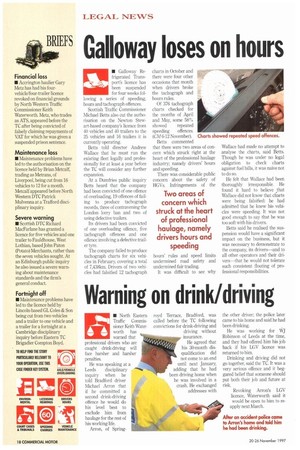Galloway loses on hours
Page 20

If you've noticed an error in this article please click here to report it so we can fix it.
• Galloway Refrigerated Transport's licence has been suspended for four weeks following a series of speeding, hours and tachograph offences Scottish Traffic Commissioner Michael Betts also cut the authorisation on the Newton Stewart-based company's licence from 40 vehicles and 40 trailers to the 25 vehicles and 16 trailers it is currently operating.
Betts told director Andrew Wallace that he must run the existing fleet legally and professionally for at least a year before the TC will consider any further expansion.
At a Dumfries public inquiry Betts heard that the company had been convicted of one offence of overloading, 19 offences of failing to produce tachograph records, three of contravening the London lorry ban and two of using defective trailers.
Its drivers had been convicted of one overloading offence, five tachograph offences and one offence involving a defective trailer tyre.
The company failed to produce tachograph charts for six vehicles in February covering a total of 7,438Iun. Drivers of two vehicles had falsified 12 tachograph charts in October and there were four other occasions that month when drivers broke the tachograph and hours rules.
Of 376 tachograph charts checked for the months of April and May, some 58% showed repeated speeding offences. (CM 6-12 November).
Betts commented that there were two areas of concern which struck right at the heart of the professional haulage industry; namely drivers' hours and speeding.
There was considerable public concern about the safety of HGVs. Infringements of the hours' rules and speed limits undermined road safety and undermined fair trading.
It was difficult to see why Wallace had made no attempt to analyse the charts, said Betts. Though he was under no legal obligation to check charts against fuel bills, it was naive not to do so.
He felt that Wallace had been thoroughly irresponsible. He found it hard to believe that Wallace did not know that charts were being falsified: he had admitted that he knew his vehicles were speeding. It was not good enough to say that he was too soft with his drivers.
Betts said he realised the suspension would have a significant impact on the business, but it was necessary to demonstrate to the company, its drivers—and to all other operators and their drivers—that he would not tolerate such consistent flouting of professional responsibilities.
















































































































